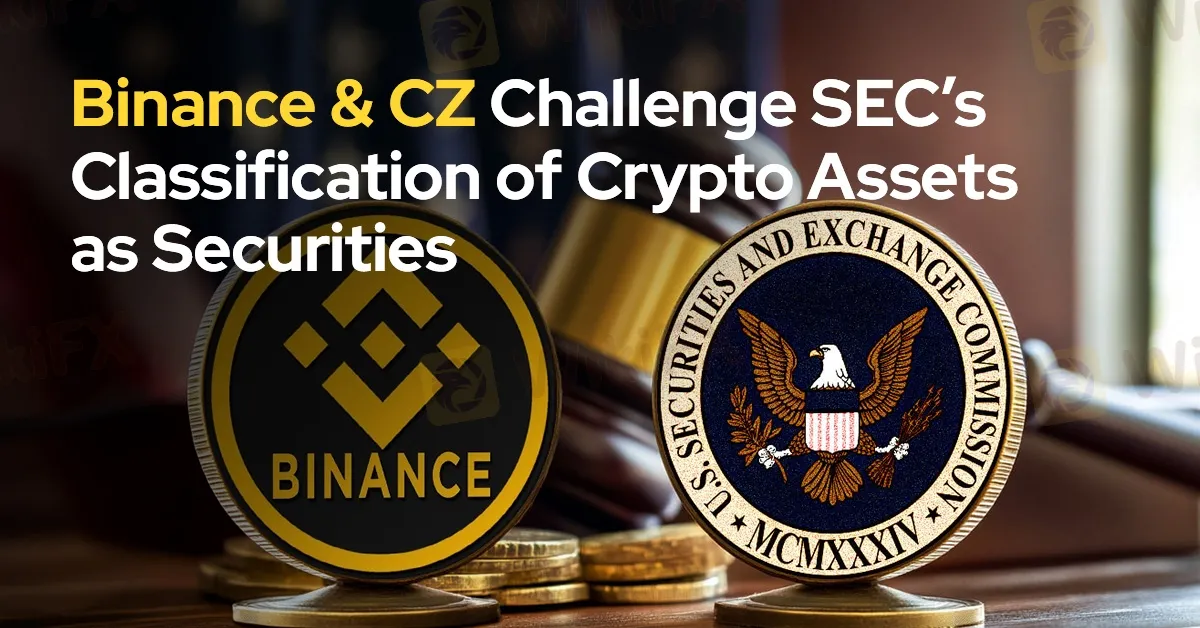Binance & CZ Challenge SEC’s Classification of Crypto Assets as Securities
Abstract:In a November 4 filing, legal representatives for Binance and its CEO Changpeng Zhao (CZ) contested the Securities and Exchange Commission’s (SEC) amended complaint, asserting that the SEC merely pays “lip service” to a court ruling that excludes crypto assets from the definition of securities. The lawyers argue that despite this ruling, the SEC has continued to disregard its implications on digital asset trading

In a November 4 filing, legal representatives for Binance and its CEO Changpeng Zhao (CZ) contested the Securities and Exchange Commissions (SEC) amended complaint, asserting that the SEC merely pays “lip service” to a court ruling that excludes crypto assets from the definition of securities. The lawyers argue that despite this ruling, the SEC has continued to disregard its implications on digital asset trading.
The court previously determined that cryptocurrencies do not qualify as securities, implying that secondary market resales of these assets should not be classified as securities transactions. However, Binance‘s legal team contends that the SEC’s amended complaint persists in labelling nearly all crypto transactions—including secondary market resales of tokens—as securities transactions. This stance is based on the premise that some investors might anticipate an increase in asset value.
Furthermore, the filing highlights that the SECs amended complaint fails to provide a clear legal distinction between assets and investment contracts. The lawyers argue that assets should not be deemed investment contracts merely because they are presented to customers within a framework of promises and expectations. They emphasize that the SEC has not established definitive standards to guide courts, litigants, or market participants in determining which digital asset transactions qualify as investment contracts.
Binances attorneys also criticize the SEC for what they describe as arbitrary decision-making, referencing a recently abandoned case where Ether transactions were initially classified as investment contracts. The legal team points out that the SEC has acknowledged its own inability to differentiate securities from non-securities like Beanie Babies at the pleading stage.

The document further elaborates on the arguments against the SEC‘s cases involving Binance and CZ, ultimately requesting the dismissal of the SEC’s claims without allowing for any amendments. This follows an amended complaint filed by the SEC in September, where the agency clarified that it did not intend to label cryptocurrencies and tokens as securities outright. The SEC admitted to using the term “securities” as a broad reference to various aspects of crypto sales and later committed to using the term “crypto asset securities,” apologizing for any resulting confusion.
The legal battle dates back to June 5, 2023, when the SEC filed a lawsuit against Binance, CZ, and several affiliated companies for allegedly violating securities trading regulations. The SEC based its allegations on a court document that recognized Binances BNB token and the BUSD stablecoin as securities. Binance is not alone in facing such legal challenges; the SEC has also filed lawsuits against other major crypto entities like Coinbase and Ripple, accusing them of offering unregistered crypto asset securities.
As the dispute continues, the outcome of Binance and CZs legal efforts could have significant implications for the broader cryptocurrency market and the regulatory framework governing digital assets.

Read more

Abu Dhabi Firms Launch Fund to Tokenize U.S. Treasury Bill ETFs
Abu Dhabi firms launch Realize T-Bills Fund, offering tokenized U.S. Treasury bill ETFs to Gulf, European, and Southeast Asian investors seeking efficient asset diversification.

What Happened to NFTs?
The NFT market, once booming with speculative investment, has dramatically declined due to economic pressures, systemic failures, and fraud, but shows signs of evolving into a smaller, more stable niche supported by dedicated investors and emerging meme tokens.

OpenSea's Come back: Can a Revamped Platform Revitalise the NFT Giant?
OpenSea, once the dominant NFT marketplace, is launching a reimagined platform in December, aiming to reclaim its position in a market experiencing a steep drop in trading volumes.

Bitcoin.com Introduces Venmo for U.S. Bitcoin Purchases via MoonPay
Bitcoin.com now accepts Venmo for U.S. Bitcoin purchases, powered by MoonPay, enhancing ease and accessibility in the crypto world for millions of users.
WikiFX Broker
Latest News
One article to understand the policy differences between Trump and Harris
Social Media Investment Scam Wipes Out RM450k Savings
FP Markets Received Three Major Awards
Zenstox: A Trader’s Nightmare? An Inside Look at Alleged Scams and Unethical Practices
Capital One Faces Potential CFPB Action Over Savings Account Disclosures
Malaysian Woman's RM80,000 Investment Dream Turns into a Nightmare
M2FXMarkets Review 2024: Read Before You Trade
US Presidential Election in Overdrive: Exploring Forex Wealth Codes with WikiFX App
How U.S. Elections Have Influenced Financial Market Trends Since 2000
eToro sponsors the Bitcoin Mena Conference
Rate Calc
